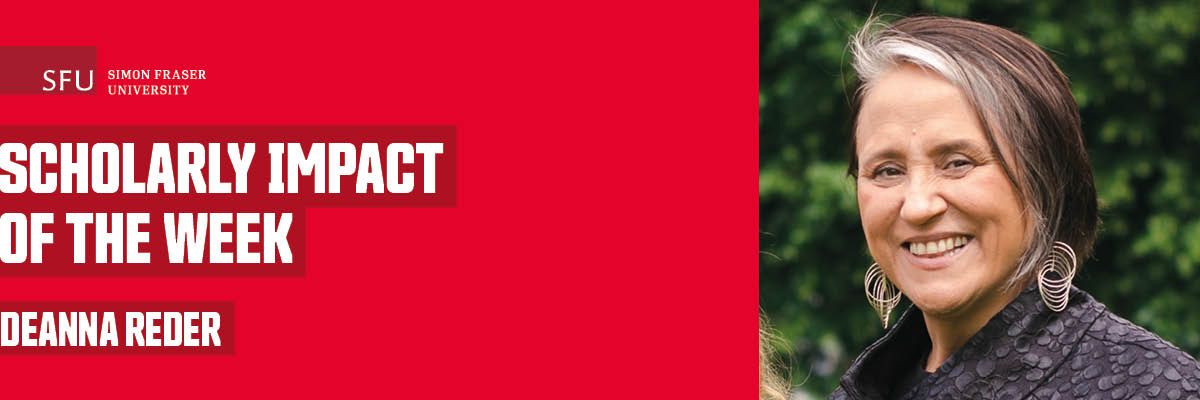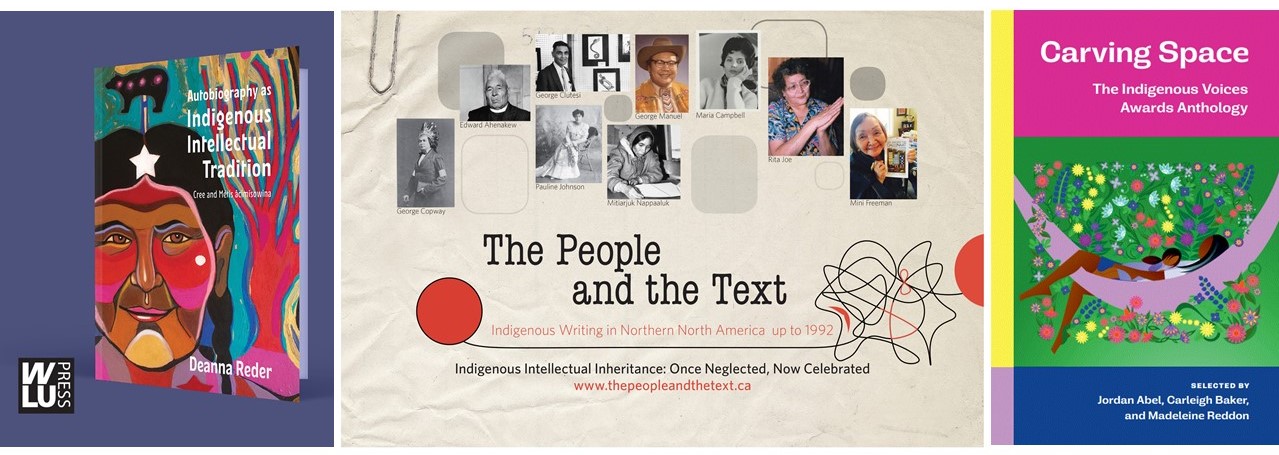
Simon Fraser University (SFU) professor of Indigenous studies and English Deanna Reder is helping emerging Indigenous writers to find their voice, while also helping long-forgotten authors find an audience.
While growing up Cree-Métis scholar Reder observed that among her relatives, sharing personal and often humorous anecdotes—âcimisowina—was a favoured genre in family storytelling. As she grew older she recognized that these autobiographical stories expressed a foundational Cree and Métis, or nêhiyawak and âpihtawikosisânak intellectual value, to speak about contexts from one’s own position, with the understanding that others necessarily see things from another perspective. Âcimisowina, she recognized, not only served as an intergenerational conduit to pass on knowledge and experiences, but also worldview.
In school and university Reder was disappointed to find little or no mention of Indigenous literature or writers. She began to seek out texts by Indigenous—and especially Cree and Métis—authors that had long been ignored by English settler scholars in favour of their own historical narrative.
For the past two decades Reder has been researching and bringing attention to the longstanding and critically neglected Indigenous archive and has made significant contributions to the field of Indigenous literary studies. Her collaborative work has produced some of the first anthologies of Indigenous fiction and literary criticism in Canada, including a major database on Indigenous writing in North America, The People and the Text. She is one of the founding members of the Indigenous Literary Studies Association, establish in 2013, and the Indigenous Editors Association, established in 2019. In 2018 she was elected as a member of the Royal Society of Canada College of New Scholars, Canada’s highest academic honour.
Reder’s latest work, Autobiography as Indigenous Intellectual Tradition calls attention to longstanding autobiographical practices that are engrained in Cree and Métis culture. Using examples of Indigenous life writing, including âcimisowina, Reder’s book explores over 200 years of Indigenous storytelling.
We spoke with professor Reder about her recent book and collaborative work.
In your book, you talk about âcimisowina, and how European scholars believed that the autobiography was their invention. Why is it significant to emphasize that autobiography is Indigenous?
In Indigenous literatures written in English, there is a clear preference for writing autobiographically. For example, look at all the writing by nineteenth century Anishinaabe authors, including George Copway, who in 1847 published The Life, History, and Travels of Kah-Ge-Ga Bowh. Too often Euro-western scholars have dismissed Indigenous autobiography as the result of colonization rather than as continuations of Indigenous intellectual traditions, as though our people have not always adopted and adapted all forms of technology and media to tell our stories, to express our epistemologies and our ontologies.
The assumption that autobiography is a European invention is connected to the mistaken idea that Eurowestern cultures are fundamentally literary while Indigenous cultures are primarily oral, while ignoring the oral traditions of Europe and the literary traditions of Turtle Island. This divide is harmful because it diminishes the contributions by Indigenous creatives all along the oral-literary spectrum.
Your book talks about waweyasinikewin, telling a funny or self-deprecating story in order to entertain the audience. Can you tell us more about the use of humour in Indigenous storytelling?
A key value in Indigenous research is what Métis scholar Warren Cariou calls “critical humility.” While European autobiographical traditions originally promoted work by “the great individual” or “the genius,” Indigenous traditions emphasize the value of stories that can help the listeners relate to and navigate all that is living in the world around them, which sometimes includes the shared hilarity of life. I don’t want to suggest that all of our stories have to be funny—but humour is a way to encourage one another.
Tell us about the work involved with The People and the Text to uncover two centuries of lost and neglected texts. Where and how did you find some of these works?
I would love to say that so far my The People and the Text (TPatT) colleagues and I have undergone a systematic search for materials. We have been able to find materials through archival searches, but what has been surprising is all we have found through our relationships with interested collaborators. By beginning with community contacts and also through conversations with retiring scholars in the field, we keep coming across gems we did not expect to find.
For example, I am very proud that TPatT research assistants transcribed the novel by Cree cleric Edward Ahenakew, written circa 1918 but never published despite his best efforts. Ahenakew’s literary executor and great-niece, Cree editor Heather Hodgson, is bringing Black Hawk to publication in May 2023 through the University of Regina Press.
Likewise, TPatT helped support a research visit by poet Joanne Arnott to see Emalene Manuel, the sister of late Ktunaxa and Secwep’emc dramatherapist Vera Manuel. My colleague Michelle Coupal and I were overjoyed to hear that besides the plays and poetry we knew about, Emalene had carefully preserved some of the best short stories even written about residential schools, authored by Vera in the 1980s for a creative writing class, but never published. We were able to release Honouring the Strength of Indian Women: Plays, Stories, Poetry by Vera Manuel in 2019 through the University of Manitoba Press.
Also, the late Cree editor Gregory Younging gave us permission to share online more than a dozen volumes of the literary journal Gatherings, published between 1990 and 2003, so that these writers would be able to better access their own work. You can visit The People and the Text website for more information and browse the multimedia database.
As well, scholar Christine Bold has shared with us plays she found through her research by 19th Century Seneca vaudeville artist Go-won-go Mohawk, as well as contemporary conversations about these plays. Following instructions from the author’s community, Bold wants the plays to be accessible so that future Seneca people can read Mohawk’s work themselves. We were also recently contacted by scholars Julie Rak, Keavy Martin, Warren Cariou, Heather Igloiorte and Armand Ruffo who want us to care for a body of work completed by Inuit writers. We will work with them to determine how to proceed.
Who are some of your favourite authors—both past and present? Who do you consider a must read author?
The editors of the original 1973 version of Halfbreed cut out a section at the last moment against author Maria Campbell’s wishes, and 44 years later TPatT project manager and settler archive-ninja Alix Shield found the redacted passage and returned it to the author, allowing Campbell to have Halfbreed restored and re-released in 2019. It is a book that still inspires so many.
For a taste of the future, everyone should keep their eyes open for Carving Space: The Indigenous Voices Awards Anthology to be released by Penguin in May 2023. Since 2018, I have been working with SFU colleagues Sophie McCall and Sarah Henzi and several others around the country to manage the Indigenous Voices Awards (IVAs). SFU colleagues June Scudeler and Eldon Yellowhorn have also worked as jurors for different awards. This year, to mark five years of the IVAs, SFU alumnus and Nisga’a poet Jordan Abel, Métis writer Carleigh Baker and Métis scholar Madeleine Reddon have edited a collection of work from finalists since 2018. It includes emerging luminaries such as Tanya Tagaq and Billy-Ray Belcourt, to writers who got their first publishing contracts after recognition from the IVAs—writers like Smokii Sumac, Cody Caetano and Francine Cunningham. For more information visit the website, Indigenous Voices Awards. And below (far right) is a sneak peek at the book cover.

For More: Check out Autobiography as Indigenous Intellectual Tradition at SFU Library and visit The People and the Text online database. Carving Space: The Indigenous Voices Awards Anthology is due out in May 2023.
This work has been supported by the Social Science and Humanities Council of Canada and the Canadian Writing Research Collaboratory.
SFU's Scholarly Impact of the Week series does not reflect the opinions or viewpoints of the university, but those of the scholars. The timing of articles in the series is chosen weeks or months in advance, based on a published set of criteria. Any correspondence with university or world events at the time of publication is purely coincidental.
For more information, please see SFU's Code of Faculty Ethics and Responsibilities and the statement on academic freedom.